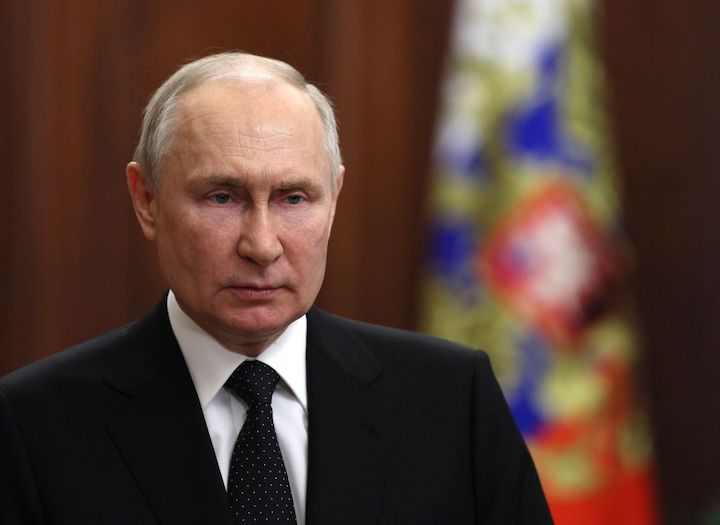As rebel tanks trundled up the highway towards Moscow yesterday morning, Vladimir Putin labelled the mutinous mercenary leader Yevgeny Prigozhin a ‘traitor’ – and vowed to crush him. But hours later Putin capitulated, allowing Prigozhin to retire to an honourable exile in Belarus and pardoning the 25,000-strong Wagner force which had spent the day in open, armed rebellion against the Kremlin’s authority. For Putin, who had built his image as Russia’s strongman protector, the particular humiliation of allowing an armed general to cross back over the Rubicon unscathed must have stung deeply.
Of course, things could have ended far worse for Putin. The alternative to letting Prigozhin escape and his men returning to barracks would have been fighting them on the streets of Rostov-on-Don, where Wagner had captured the headquarters of the Russian Army’s Southern Military Command. Worse, the troops Putin would have had to send in were Chechen president Ramzan Kadyrov’s semi-irregular fighters. For the people of Rostov (and all of south Russia), memories of the two Chechen wars of 1995/6 and 1999/2000 are still painful – and the sight of Chechens attacking ethnic Russians on the Kremlin’s orders would have been deeply divisive.
Putin’s infamously touchy pride has been badly hurt, and his attempts to compensate may be terrible
So in one sense Putin has won. He defused a desperate rebellion that, for a single day, vividly showed Russians what a civil war on their territory looks like – and how fragile Putin’s security state could be. The cost of that victory is yet to be reckoned. By rights, heads should roll – first and foremost those of defence minister Sergei Shoigu and Valery Gerasimov, chief of the general staff, whose escalating feuds with Wagner were the proximate cause of the mutiny. But those are precisely the heads that Prigozhin demanded should roll, and if Putin fires them it will look like he is acceding to the rebels’ demands. Shoigu is one of Putin’s oldest political allies and closest personal friends – the famous 2007 photo of Putin riding shirtless in the Siberian forest was taken during a fishing trip with Shoigu in his native Tuva. Yet Shoigu has clearly mismanaged the war effort and is deeply unpopular, not just with Wagner, but also with ultranationalist military bloggers and (if social media posts are anything to go by) swathes of the regular army, too. Putin is dammed if he fires Shoigu, and dammed if he doesn’t. The one piece of good news for Putin is that no senior figures in the army, security services or government joined Prigozhin’s advance.
Just as politically significant, though, were the scenes on the streets of Rostov after Prigozhin ordered his tanks to turn back. As fully armed Wagner troops left the Rostov headquarters in a convoy of the group’s own infantry fighting vehicles, beeping their horns and joy-firing Kalashnikovs into the air, large crowds of citizens gathered to applaud them on their way. ‘Wagner! Wagner!’ they cheered, shaking soldiers’ hands through jeep windows. Prigozhin himself, driven into exile in an SUV, was mobbed as a hero by the locals – who, when police cars lined up to supervise the withdrawal, shouted ‘shame!’ and pelted the cops with debris. It’s hard to overstate how extraordinary such scenes are, and how damaging for the Kremlin’s authority. Armed rebels took over a major Russian city – and were immediately treated as war heroes by a population which had been hitherto utterly unenthusiastic about any kind of anti-Putin protest.
How will a man who has spent an entire career in the KGB, and who over 23 years in the Kremlin has surrounded himself almost exclusively with ex-KGB men, react to this kind of challenge? Fairly obviously, Putin’s instinct will be to crack down even harder on dissent in society – and particularly in the military. How such a move will impact on Russia’s war effort remains to be seen. But what is already clear is that Putin will have to work hard to restore his damaged reputation as Russia’s infallible protector.
Proverbially, a wounded predator is more dangerous than ever. Putin’s infamously touchy pride has been badly hurt, and his attempts to compensate may be terrible. Furthermore, Prigozhin’s rebellion showed the Russian elite that wartime Russia’s society and security are extremely fragile – and that violent ultranationalist forces outside the Kremlin’s control are waiting in the wings to take advantage of chaos. That, paradoxically, may give pause to those who might wish to see Putin replaced by a more amenable member of the elite such as Russian Prime Minister Mikhail Mishustin or Moscow’s mayor, Sergei Sobyanin. Putin is the devil the elite knows – and even weakened, he remains their best hope for standing against the violent, irrational and unpredictable forces of revolt.







Comments